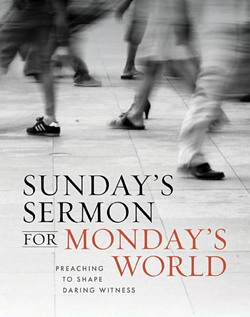Preaching as Witness in Missional Theology

What happens to preaching when it is shaped by missional theology? In her new book, Sally A. Brown, works out a preaching theory focused on witness and empowering ordinary Christians to become witnesses in daily life. Her book is called Sunday’s Sermon for Monday’s World: Preaching to Shape Daring Witness. Her book is part of the well-known “Gospel and Our Culture Series.”
At the heart of her book are stories of courageous, daring witness like these:
Lodged in our memories are the images of these creative, courageous witnesses, daring to signify with their bodily presence in contested spaces their belief in powers of justice and hope that cannot be defeated by those who aim to win by force. An African American woman seated resolutely on a city bus; a cellist absorbed in his music amid destroyed buildings; a slight, lone figure silhouetted before a tank; a young Pakistani woman with bandaged head turned toward the camera, smiling as best she can: these women and men chose to act as “agents of [redemptive] interruption.”
We live in a world now that is messed up with terrorist tactics and political warmongering and the like. It’s no longer my father’s world. What’s it like to be a witness now? It’s easier to withdraw.
Under conditions like these, it takes energy to stay socially and politically engaged. The temptation to retreat into homogenous social enclaves along class, ethnic, or religious lines, or to take refuge in social-media “echo chambers” where the disturbance of difference is filtered out, is ever present. Christians are as tempted as anyone else to take refuge in such artificially homogenous spaces. But can we do so with integrity, in precisely that historical moment when public testimony to the mercy ,inclusive love, and restorative justice of God-in deed as well as in word-could not be more crucial?
So, withdrawal into conventicles is not an option. We are to be witnesses. Here are Brown’s major questions:
What kind of public witness to God’s ongoing, redemptive engagement with the world is called for under the conditions described here? What kind of daring, everyday countertestimonies to the all-too-easy rhetoric of hate might strategic preaching on our part inspire? In other words, how can individual believers discern and, with imaginative courage, participate in the ongoing, redemptive activity of God in the ordinary settings of their everyday lives, testifying with their lives to the mercy, love, and justice of God?
This means for her the question about preaching and sermons on Sunday (she’s a homiletics prof after all):
Precisely what strategies in Christian sermons best equip the men, women, and even children in our pews to take daring action that testifies to the radical mercy, inclusive love, and restorative justice of God, doing so in ways that are creative, agile, and apt to the demands of a given moment?

Her heartbeat is missional theology and that means attractional servics are no longer the means. People aren’t coming to churches to hear sermons so the church has to be sent into the world to become God’s missional agents of grace and justice and peace:
The cultural shifts that have made religious communities’ ostensibly "public” worship services far less “public," in the minds of many, raise a question for those of us who want to make the news of God’s mercy and justice, expressed in Jesus Christ, more available: If the credibiIity of Christian faith no longer depends on the sermons we preach in our “public” worship services, on what does the credibility of Christian faith depend? The answer seems obvious. If Christian faith is going to have any persuasive appeal for the religiously uncommitted, that appeal will depend on what Christians say and do outside their church buildings in their Monday-to-Saturday lives, in those truly public spaces where they work,learn, exercise, socialize, and volunteer, shoulder-to-shoulder with persons who embrace other faiths or none.
If the credibiIity of Christian faith no longer depends on the sermons we preach in our “public” worship services, on what does the credibility of Christian faith depend? The answer seems obvious. If Christian faith is going to have any persuasive appeal for the religiously uncommitted, that appeal will depend on what Christians say and do outside their church buildings in their Monday-to-Saturday lives, in those truly public spaces where they work,learn, exercise, socialize, and volunteer, shoulder-to-shoulder with persons who embrace other faiths or none.
This is wher missional theology – the missio Dei – becomes the operative category for Sally Brown. A movement that came of age in the 90s (here she seems to neglect the Roman Catholic contribution as well as the fundamental vision of David Bosch, as she favors the American scholar Darrell Guder). What does this mean?
First, it is fundamentally Trinitarian: God’s work in the world through the Son in the Spirit, and all tied into the Trinitarian-ness of God.
Second, this means the church, like the sending God, is sent to participate in the sending God’s redemptive mission in the world.
Third, missional initiatives mean what God is doing not only in the church but also in the world. [One can’t help but notice here a tie back to the social gospel as well as to liberation theology in this orientation.] The sent ones enter into what God is doing. [SMcK: I have always a question here: What is it that God is doing? Her next point leads us to her answer.]
Fourth, God’s redemptive work is broad: the whole person in the whole world.
Thus,
Missional theology, as a whole, urges a vision of Christian witness to God’s redemptive work, decisively inaugurated in Jesus Christ and continuing in the power of the Spirit, that is: (1) broader than soul-salvation;(2) holistic, addressing the needs of the whole person and human community, as well as the ecosystems of our planet; (3) attentive to the wholeness of not only individual persons, but also human communities (especially marginalized communities with limited access to the goods that make for a thriving life); and (4) necessarily expressed in deed, as well as word.
Which means...
God’s redemptive activity, engaging the whole human person and wholeness of human communities, can be expressed through the efforts of people outside the church and willinclude efforts that contribute to human beings’ physical, emotional, and social well- being and empowerment.
In this chp Brown turns then to the faithful-practices movement at work alongside missional theology and praxis to focus on all the practices of the church – like worship, hospitality, faith-formation practices, etc – as well as practices that overlap with those outside the church – like justice activism, peacemaking – but especially practices that mediate God’s redemptive work in the world.
A third element is a postliberal hermeneutic that drives much of missional theology and missional practices.
Postliberal theology emphasizes reading Scripture as a unified narrative of God in relationship to humanity, one that shapes the lives of individuals and communities around a distinctive set of practices and produces a distinctive theological “grammar.”
There is lots of talk about narratives in the Bible, whether they are the singular biblical narrative (reading forward) or the Christian narrative (reading backward), but the big idea is that the narrative is the theological structure of Christian identity and practice.
Preaching – and we will get to this in our series – is impacted deeply by these main ideas.
Jesus Creed is a part of CT's
Blog Forum. Support the work of CT.
Subscribe and get one year free.
The views of the blogger do not necessarily reflect those of Christianity Today.


















